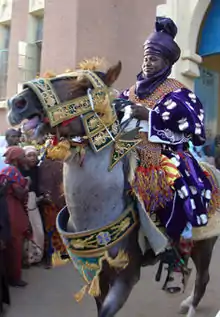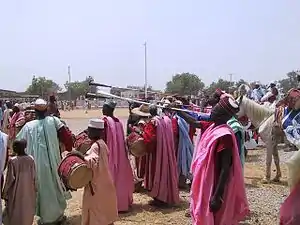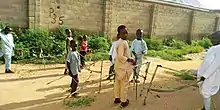Durbar festival
The Durbar festival is an annual religious and equestrian celebration in several cities of Nigeria including Kano, Katsina, Sokoto, Zazzau, Bauchi and Bida. The festival marks the end of Ramadan and also coincides with the Muslim festivities of Eid al-Adha and Eid al-Fitri.[1]



It begins with prayers, followed by a colourful parade of the Emir and his entourage on horses, accompanied by musicians, and ending at the Emir's palace. Durbar festivals are organised in almost all cities of northern Nigeria and has become a major tourist attraction. In Northern Nigeria, the practices dates back over 200 years.
Etymology
The word Durbar is of Persian origin and it was first linked to ceremonial assemblies marking the proclamation of Queen Victoria as the Empress of colonial India in 1877. But the native Hausa use the term "Hawan Sallah" to describe the festival - with Hawan meaning the "Mount of Eid", referencing the physical mounting of the horse.[2]
History
Pre-colonial era
Historians say the "Hawan Daushe" (Mount of Daushe) was introduced to Kano during the reign of Muhammadu Rumfa in the 1400s. During and after the Fulani Jihad horses were used in warfare to protect the Emirate. Each noble household was expected to defend the Emirate by forming a regiment. Once a year, the regiments would gather for a military parade to demonstrate allegiance to their ruler, by showcasing their horsemanship, readiness for war, and loyalty.
Colonial era
Other say the Durbar festival was introduced to Nigeria by colonial administrators with political objectives in mind.[3] The word Durbar is of Persian origin and it was first linked to ceremonial assemblies marking the proclamation of Queen Victoria as the Empress of colonial India in 1877. In Nigeria, the events then were ceremonial in nature, the first Durbar was held in 1911, subsequent ceremonies were held in 1924, 1925, 1948, 1960 and 1972. The ceremonies linked together pre-colonial aspects of martial display, colonist created assemblies and celebrations of important events in Northern Nigeria.[4]
Independence
The Durbar festival featured prominently in the 2nd World Black and African Festival of Arts and Culture sometimes known as Festac 77. Since Festac, the colonial origins was gradually phased out and the events were linked with pre-colonial traditions such as the importance of horses for military purposes and ceremonies in the Bornu Empire and the ceremonies of 'Hawan Sallah' and 'Hawan Idi'.
See also
References
- "A 100-Year-Old Muslim Festival of Horse Riding". Folio Nigeria. Retrieved 17 August 2020.
- "Northern Nigeria's cultural treasure". Pulse Nigeria. 2017-09-05. Retrieved 2020-07-22.
- Steinmetz, George (1999). State/culture: State-formation After the Cultural Turn. p. 217.
- Augi, Abdullahi (1978). The History and Performance of Durbar in Northern Nigeria. p. 1.